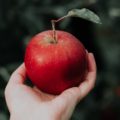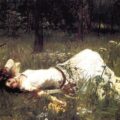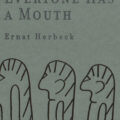Chameleon Poet: The Owl Was a Baker’s Daughter, by Gillian Cummings

In selecting her manuscript for the 2018 Colorado Prize forPoetry, John Yau praises Gillian Cummings using a phrase from Keats, calling her a “cameleon Poet.” Cummings has written two prize-winning books of poetry and three chapbooks. She’s now at work on her first novel. The author is also a visual artist whose drawings of flowers, leaves, and seedpods reveal an eye that relishes the textures of the natural world, a sensibility reflected in her poems.
Individually exquisite, her poems delight in hydrangea, buckthorn, beech; in magpies, doves, chipmunks.Dissociative in diction, “Of Water and Echo” is a chant of madness the glistens with consonance and internal rhyme:
It’s cold and damp in the song of water
ringing of ripple, of rapid and fade, of
day’s end and the coming of blade, of the axe’s
edge opening the throat of bold call. Of
what the moon won’t say in any emergency,
any anxious fall, reds in the greens of summer,
the lone hollow of tree by the river
in which she sings, water in her teeth.
The title of the manuscript that Yau selected, The Owl Was a Baker’s Daughter, borrows a line spoken by Ophelia, and the book traces the experiences of a character through madness, depression, and healing (or death). The book is structured into four parts. Sections two and four are prose poems that cleave to Ophelia’s voice, while the first and third parts consist of poems that are “once sonnets”—they’re sonnets no longer—and written in the voice of the poet.
“All of the poems,” Cummings explains, in an interview with On Denver, “from beginning to end, take as their subject the topic of suicide, suicidal ideation, and the life that can come back to one after an experience of coma, though of course Ophelia dies in Hamlet, as she also dies in this book…. I let the reader imagine exactly what is going on, in part because I do want the experience to be disorienting, to feel like madness.” She shows how well it does in “If Wings Neither Waxed nor Waned”:
If your clawfoot bathtub is full of captured pigeons,
your hair knots from sheer lack of rain. Pull
pain up the spiral staircase, take down fringed,
frayed shawls from the wardrobe’s dim musk.
At times, reading The Owl is like driving in the dark through a blizzard, snowflakes hurling themselves at the windshield in a bewilderment of beauty. The guard rail lies perilously obscured at the road’s edge. Another poem, “All of it Alive,” is simply lovely:
She steps and one thousand moths lift,
lift lightly, spiral-whirl. They flicker and fleck,
weaving a world around her. Over roots
impossibly stone-clung, moss-covered,
the river plumbs the places where it pools.
Elsewhere: sea-urchins, harebells, cowslips, brine, as if the poems aspire to name each one of the “ten thousand things” of creation. But the names follow one after another, after another, after another, to generate a sensual landscape in which a reader’s usual landmarks are missing, at once elegant and disorienting.
The unvoiced questions: what poetic landmarks give perspective and hope? What provides an anchor? What, in fact, is mood, where are happiness and sadness rooted in the sensory experience? What is ground in the flux of the ten-thousand things? These questions thread the maze of details. Cummings takes us not only to the continent of despair, but also, in “Unknowing The Clouds,” to the netherworld between forgetting and “unknowing,” a region of uncertain identity, a world of choice between healing and madness:
The cloud of forgetting below her,
full of sea-softened, blue bottle shards,
full of hydrangeas and swans and jays
and everything maned—horses a-gallop,
sorrel through sorrel, roan through the moan
of fast winds—she’s sore, she’s sorrowful, she can’t
push them down: thoughts of the earth she loved.
The cloud of unknowing above her—Pierce it,
she’s told, with a ray of bare heart, of holy ardor.
The Cloud of Unknowing is a text by the anonymous 14th Century Christian monk, who left an extraordinary treatise on prayer that dwells on forgetting. Forgetting is also the first stage—along with working and loving—of a three-part treatment plan for women with PTSD developed by Phaly Nuon, nominee for the Nobel Peace Prize for her humanitarian efforts with women in the refugee camps after the atrocities of the Khmer Rouge.
In his lucid atlas of depression, The Noonday Demon, Andrew Solomon says,of breakdown, “You are never the same once you have acquired the knowledge that there is no self that will not crumble.” Here is Cummings, from “A Matryoshka Doll Is a Nest Made of Eggs”:
At least she is safe. At least
her body. And if she breaks, as she
must, if she splits or shatters or goes
fine, at least she grows smaller
and smaller with each dose
of another’s pleasure…
Solomon’s The Noonday Demon also quotes Nuon: “All the surface of the body has the depression just below it, and we cannot take it out, but we can try to forget the depression even though it is right there.” Next,the women learn to work at something that they take pride in, and to love, practicing first in simple ways with each other. “At the end,” Nuon explained in a conversation with Solomon, “I teach them the most important thing. I teach them that these three skills, forgetting, working and loving are not three separate skills, but are part of one enormous whole. …when they have learned this, they are ready to go out into the world again.”
If that program resembles the arc of The Owl, it speaks to the emotional intelligence of a person groping to make sense of the world. The almost-sonnets admit an organizing principle like a ray of sunlight. Eidetic references to her Zen training and Christian mysticism interject a sense of scale, a place from which to view the blizzard without being overwhelmed. Her touch is light, confined to a careful phrase borrowed from a text by an anonymous mystic, or from a Buddhist sutra, and transformed to reflect her own iconography.
The moon is an image of Buddha, and “Moon Girls of the Burning Barn” references the parable in which only a false promise succeeds in luring a man from his burning house because he could not imagine real emancipation. In part I, the Moon Girls appear to be stuck in the burning barn, it is not until Part III, in “Moon Girls of the Medicine” that they emerge to offer wisdom:
You were about to float away
so they taught you not to. Softly
into quiet they come, finely, into
spooked light—winged ones they bring,
goldfinch, marlin, wren in enormous
nest: the begin again
“I never quite understood how to live the wisdom of Zen,” Cummings admits to On Denver, “though I studied under a Buddhist teacher for six years and took the Zen precepts called ‘Jukai’ at the same time that I was starting to fall apart from several unbearably sad rifts in my life.” The precepts of Jukai outline a path that leads beyond the dream of the self, revealing the truth that personal well-being is intricately connected to the well-being of others.
The Owl is an effective, lyric rendition of the suffering of one individual, someone who longs for living to end. It interrogates the nature of the self, asks how to find the level of detachment that is beyond the suffering, allows the sufferer to float free. There is healing in “They Break Open in Sun but Stay Dark:” “You have been many people//but none of them is you. You live //in a place of dogwood petals fallen // on lake water.”
Toward the end of the book, a turning begins, reminiscent of a practice in Judaism, teshuvah. A practitioner makes their petition of return three times per day. Rabbi Adin Steinsaltz, in his book Teshuvah, says, “In one respect, there is nothing more difficult than doing teshuvah, because teshuvah means transforming oneself. In another respect, there is nothing easier than teshuvah; a split second of turning is already considered teshuvah.”
The volume’s layered portrait of the depressed heroine includes a narrative of search that transcends the circumstances of the protagonist. How does life return? How does a woman make meaning from loss? How does she navigate the dissolution of self? In “Beech, Birth, Buckthorn,” moments of turning appear and disappear. “Breathe in, and everyone breathes. Breathe out, // the world exhales. Only the child, fevered, knows: //Not to pray, not even for nothing, but to become prayer.”
About Kathryn Weld
Kathryn Weld holds a Ph.D. in Mathematics from the Graduate Center, CUNY, and an MFA from Sewanee School of Letters. Her work has appeared in Midwest Quarterly, Southeast Literary Review, Bellevue Literary Review, Connotations Press, Storyscape Journal, Valparaiso Poetry Review, and Still, the Journal. Weld has been a finalist for the Gearhardt Poetry Prize as well as the Jan and Marica Vilcek Prize for Poetry.





